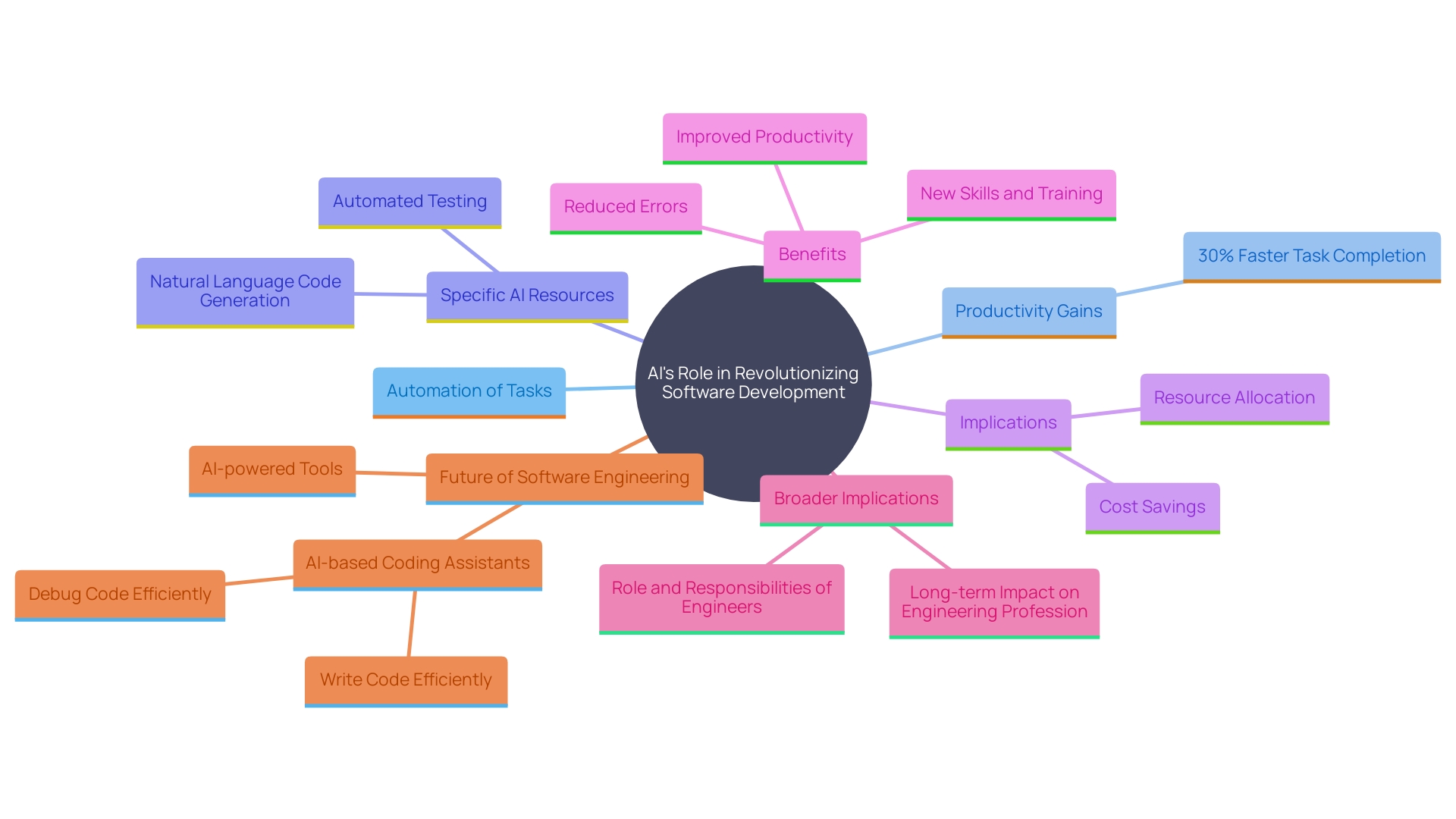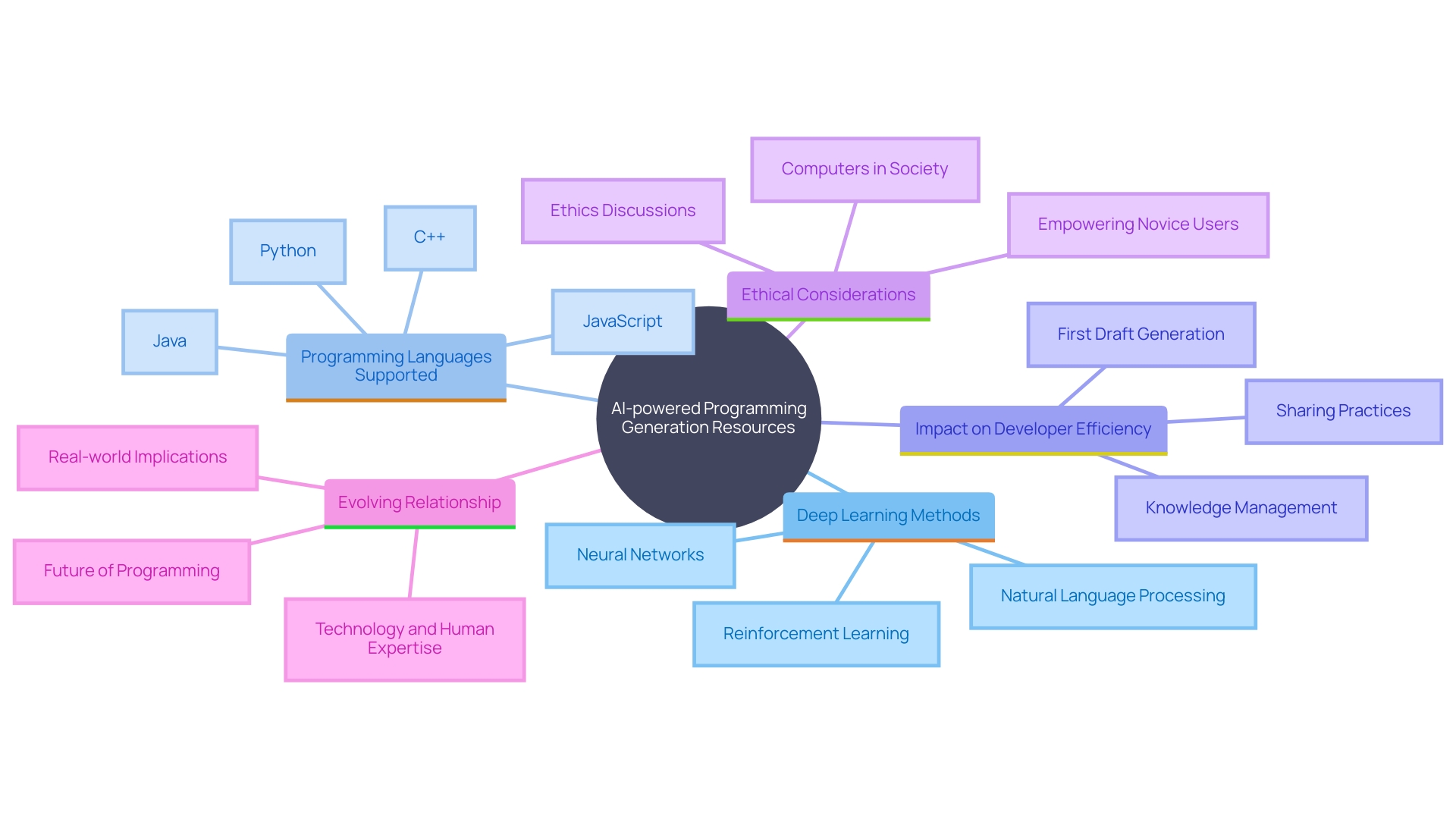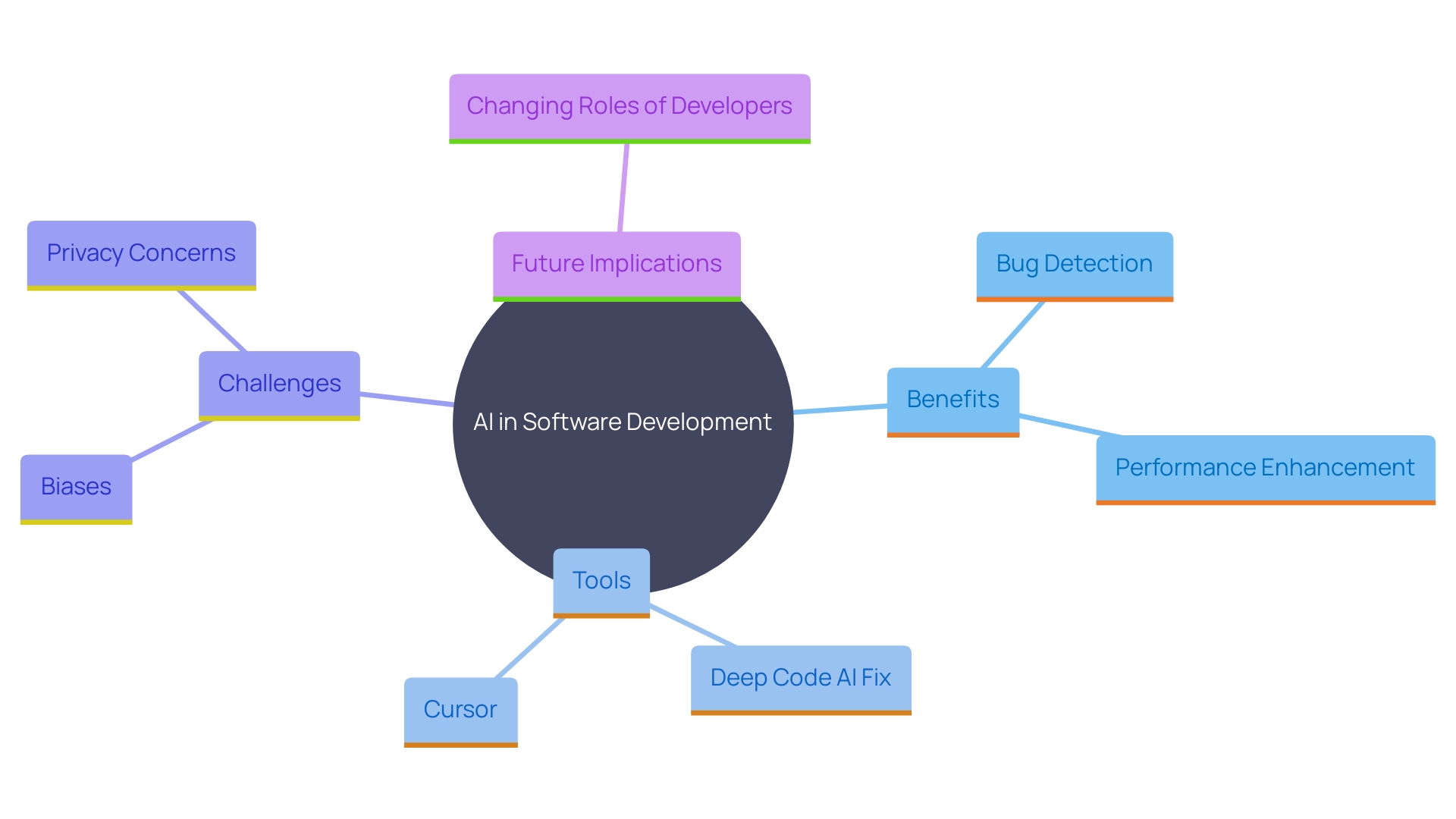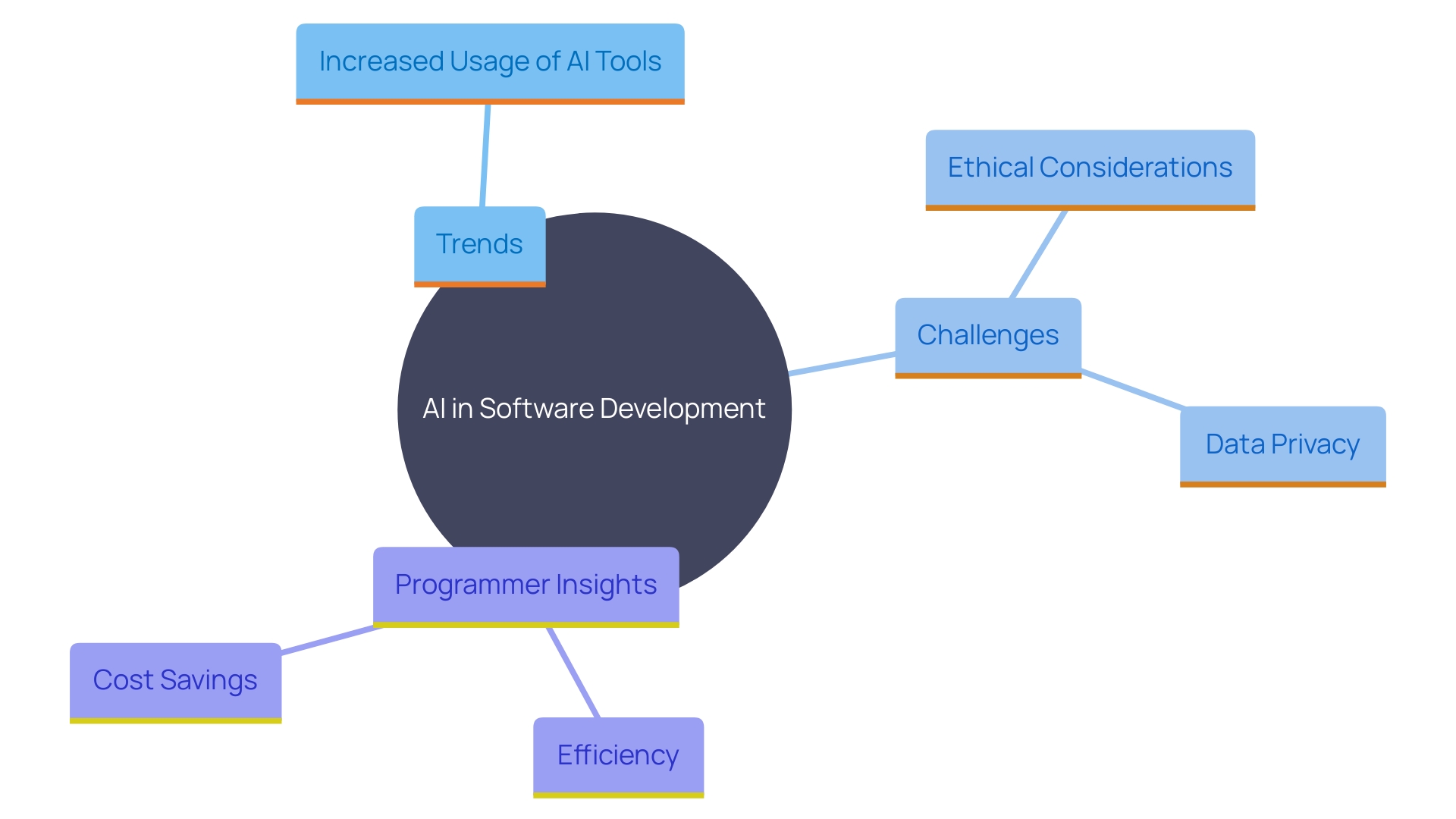Introduction
The transformative power of AI in automating complex tasks is reshaping the software development landscape. By harnessing AI technologies, developers are now able to automate intricate and repetitive tasks, allowing them to focus more on high-level problem-solving and innovation. The integration of AI-driven tools into development workflows not only streamlines processes and reduces manual errors but also significantly speeds up project timelines.
For example, teams utilizing AI tools have been shown to complete tasks approximately 30% faster than those relying on traditional methods, underscoring the substantial productivity benefits that AI offers.
AI's capabilities extend to various aspects of coding, including natural language code generation, automated testing, and intelligent code completion. These advancements are continually evolving, becoming more adept at understanding natural language, logic, and complex algorithms. This evolution promises even greater efficiency and productivity gains in the future.
Moreover, AI's role in software development is crucial in optimizing resource allocation, leading to significant cost savings and efficiency improvements. As the demand for faster development cycles grows, AI tools are instrumental in reducing time-to-market without compromising quality. The rapid adoption and continuous innovation of AI technologies are not only transforming the roles and responsibilities of software engineers but also heralding a new era in software development.
The Role of AI in Automating Complex Tasks
AI technologies are revolutionizing software creation by automating complex and repetitive tasks, enabling developers to focus on higher-level problem-solving and innovation. Utilizing AI-powered resources, teams can enhance their workflows, minimize manual mistakes, and significantly speed up the development process. For instance, a study found that teams utilizing AI resources finished their tasks approximately 30% quicker on average than those employing traditional methods. This substantial improvement in productivity highlights AI’s ability to transform software engineering.
AI resources such as natural language code generation, automated testing, and intelligent code completion are especially effective in enhancing programming speed and efficiency. The continuous evolution of these technologies promises even greater advancements, with devices becoming more adept at understanding natural language, logic, and complex algorithms.
Moreover, the integration of AI into coding practices optimizes across projects, leading to major efficiency gains and cost savings. As companies require quicker production cycles, AI’s role in decreasing time-to-market without sacrificing quality becomes increasingly essential. The swift uptake and continuous progress of AI resources highlight their transformative effect on the sector, reshaping the roles and responsibilities of engineers and paving the way for a new age in software creation.

AI-Driven Code Generation and Assistance
AI-powered programming generation resources are transforming the development environment. These tools utilize deep learning methods, especially Natural Language Processing (NLP) and sequence generation, to examine extensive datasets comprising millions of lines across different programming languages. This allows the models to associate developer inputs, such as comments or incomplete scripts, to suitable outputs.
For instance, OpenAI’s Codex can produce programming scripts in Python, JavaScript, and TypeScript from simple natural language descriptions. By grasping the developer's purpose and the background of the current software framework, AI resources can provide highly pertinent snippets, greatly and minimizing mistakes. These AI-driven suggestions ensure consistency and coherence within the code, enabling developers to deliver high-quality applications more efficiently.
The effect of these instruments is profound. Turing's research on AI-boosted application creation shows a 25% average rise in programmer efficiency, emphasizing generative AI’s contribution to speeding up project completion and product advancement. Such advancements indicate a fundamental shift in the dynamics between technology and human expertise, with AI resources becoming integral to software development.
As AI technology evolves, it is crucial to address transparency, ethical concerns, and the limitations of these tools. By providing clear guidelines and focusing on augmenting rather than replacing human developers, AI coding assistants can be more effectively and responsibly leveraged to enhance human coding abilities.

Improving Code Quality through AI-Enhanced Review and Debugging
AI has become essential in improving software quality through advanced review and debugging processes. By leveraging AI algorithms, developers can detect potential bugs and vulnerabilities before application deployment. These AI-enhanced tools examine programs for best practices, style consistency, and performance issues, providing real-time feedback that maintains . This proactive approach not only streamlines the development process but also results in more robust and secure software products.
One notable example is the Deep Code AI Fix (DCAIF), which has been successfully integrated into various projects to demonstrate its potential. For instance, in a Java example project used in workshops, DCAIF has demonstrated how even intentionally vulnerable programming can be analyzed and enhanced. The source script, available for review, underscores the tool's capability to identify and rectify security flaws, making it a valuable asset for developers.
AI's impact on coding extends beyond just bug detection and performance enhancement. Tools like Cursor, which utilizes custom-trained machine-learning models, forecast the most probable next action based on the context of the programming. This capability significantly reduces the time and effort required for traditional programming reviews, making the process more efficient and intuitive. According to recent studies, AI-based coding assistants have led to a notable uptick in code quality, with developers reporting improved productivity and test coverage.
However, the integration of AI in coding also brings challenges. Issues such as biases, privacy, and intellectual property concerns need to be addressed to build trust in these tools. Clear guidelines on the appropriate use cases and limitations are essential to ensure that AI augments and empowers developers rather than replacing them. By addressing these challenges, AI coding assistants can be more effectively and responsibly leveraged to enhance human coding abilities.
The transformation brought about by AI in the coding landscape is undeniable. As AI technologies continue to evolve, they are reshaping the role and responsibilities of engineers, ultimately revolutionizing the manner in which applications are developed. 'The future of coding, enhanced by AI, promises a more efficient, secure, and innovative program creation process.'.

The Future of AI in Software Development: Trends and Challenges
'The rapid evolution of AI in software creation is set to introduce both exciting trends and formidable challenges.'. As AI-powered tools become more integral to coding, developers are faced with the task of balancing human creativity with automation. A recent highlighted the varied use of AI assistants across different programming activities, such as implementing new features, writing tests, bug triaging, refactoring, and creating natural-language artifacts. This diverse usage underscores the need for developers to adapt and collaborate with AI technologies to unlock their full potential.
'The integration of AI into software creation also brings significant considerations around ethics, data privacy, and the necessity for ongoing learning.'. 'With 76% of respondents intending to utilize AI resources in their development process this year, up from 70% last year, it is evident that Ai's influence is increasing.'. However, the increased adoption also raises security concerns, particularly regarding data privacy and the potential for AI-specific cyberattacks. Continuous maintenance and updates are essential to keep AI systems practical and secure, making robust security protocols crucial.
Moreover, Ai's influence is reshaping the engineering field, redefining roles and responsibilities. Insights from industry leaders reveal that nearly half believe AI tools will lead to efficiency gains or cost savings, while another 20% anticipate improved throughput or faster time to market. This transition to an era of foundation models promises to transform the software engineering landscape, highlighting the importance of embracing AI while addressing the inherent challenges it brings.

Conclusion
The integration of AI into software development is undeniably reshaping the industry, offering significant advantages in efficiency and productivity. By automating complex and repetitive tasks, AI tools empower developers to concentrate on higher-level problem-solving and innovation. The ability to complete tasks approximately 30% faster with AI-driven solutions illustrates the transformative impact on productivity, enabling teams to deliver high-quality software more rapidly.
AI's capabilities extend beyond mere automation; they enhance code quality through advanced review and debugging processes. Tools that identify potential bugs and vulnerabilities proactively ensure that software products meet high standards. As AI-driven code generation and assistance tools become more sophisticated, they significantly reduce errors and improve consistency within codebases, reinforcing the importance of these technologies in modern development practices.
Looking ahead, the future of AI in software development presents both exciting opportunities and challenges. The growing reliance on AI tools necessitates a balance between human creativity and automation, as developers adapt to new roles and responsibilities. Ethical considerations, data privacy, and ongoing learning will be critical as the industry navigates the evolving landscape.
Ultimately, embracing AI technologies will unlock new potentials, driving the software development process toward greater efficiency, security, and innovation.
Frequently Asked Questions
What role does AI play in software development?
AI technologies are revolutionizing software creation by automating complex and repetitive tasks. This allows developers to focus on higher-level problem-solving and innovation, ultimately enhancing productivity and minimizing manual mistakes.
How much faster can teams complete tasks using AI?
Studies have shown that teams utilizing AI resources can finish their tasks approximately 30% quicker on average compared to those using traditional methods.
What specific AI resources are being used in programming?
AI resources include natural language code generation, automated testing, and intelligent code completion, all of which improve programming speed and efficiency.
How does AI improve coding practices?
AI tools analyze extensive datasets, allowing them to produce relevant code snippets based on developer inputs. This ensures consistency and coherence within the code, enhancing overall quality.
What are the benefits of integrating AI into coding?
The integration of AI optimizes resource allocation, leads to efficiency gains, and enables quicker production cycles while maintaining software quality. AI tools also help in detecting bugs and vulnerabilities before deployment.
Can you provide an example of an AI tool used in coding?
One notable example is Deep Code AI Fix (DCAIF), which has demonstrated the ability to analyze and enhance code, identifying and rectifying security flaws effectively.
What challenges come with the use of AI in software development?
Challenges include addressing biases, privacy concerns, and intellectual property issues. Clear guidelines on the use of AI tools are necessary to ensure they augment rather than replace human developers.
How is AI changing the roles of software engineers?
AI is reshaping the responsibilities of engineers, emphasizing collaboration with AI technologies. This transition requires developers to balance human creativity with automation.
What are the ethical considerations related to AI in coding?
There are significant considerations around ethics, data privacy, and the need for ongoing learning as AI tools become more integrated into the development process.
What is the future outlook for AI in software development?
The future promises a more efficient, secure, and innovative software creation process. As AI technologies continue to evolve, they are set to transform the software engineering landscape significantly.




